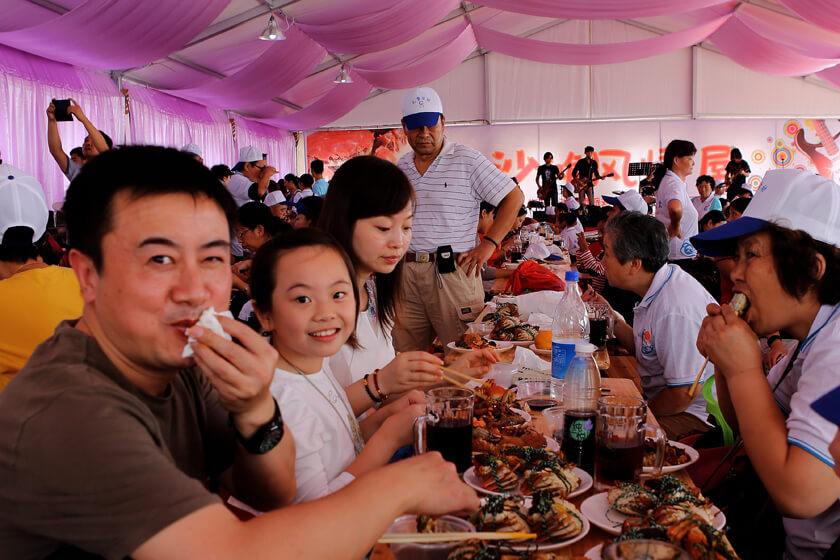While there are many incredible sites in Nanjing, the city’s cuisine is an adventure all its own—from alleyways crammed with fragrant food stalls to elegant fine-dine restaurants.

With Nanjing’s long history, its cuisine has had plenty of time to develop; in fact, it’s an offshoot of Huaiyang cuisine, which is officially recognized as one of China’s Four Great Cuisines, alongside Cantonese, Shandong and Sichuan cooking traditions. With its plum location in the fertile Yangtze River Delta, Nanjing’s cuisine is bursting with regionally grown produce and seafood, and great importance is placed on seasonality, finely tuned flavors and an artistic, colorful presentation.
Duck Delicacies
If there’s one thing Nanjingers know how to prepare, it’s duck. Nanjing is said to have been the birthplace of Peking Duck (called “Jinling Duck” throughout Jiangsu Province), but there’s another dish that’s even closer to their hearts: Nanjing salted duck. This cold dish, usually served as a starter or snack, sees whole ducks simmered in brine, strung up to dry for several days and then sliced into juicy, tender chops. Travelers can even purchase vacuum-sealed bags of salted duck at supermarkets to bring home.
Another distinctive Nanjing delicacy is duck blood soup, a ubiquitous staple of food stalls throughout the city. The name sounds adventurous, but this dish is better devoured than feared. The blood of a duck is fermented, and the thickened curds are then sliced into a gently spiced broth, along with vermicelli noodles, fried tofu and additional duck parts such as gizzards. The result is a rich, savory bowlful that offers a true taste of Nanjing.
Yangtze River Delta Delights
Water is the lifeblood of Nanjing, from the Yangtze and Qinhuai rivers to the region’s plentiful lakes. As a result, many local dishes are graced with river fish, shrimp and crustaceans. The most famous residents of Gucheng Lake, located in the far south of Nanjing, are hairy crabs. These rich, buttery crustaceans are bred here and shipped throughout China. Most locals enjoy them steamed, cracked and dunked into a vinegar sauce. Hairy crabs (the name refers to the fine fur that fringes their claws) even have their own festival, which celebrates the harvest every autumn.
Don't Forget Dumplings
Steamed or fried, dumplings are one of China’s quintessential street foods, and Nanjing just happens to specialize in a few varieties of these bite-size pockets of flavor.
The pan-fried beef dumplings are a source of local pride, and government culinary experts even declared the dish one of Nanjing’s “eight traditional Qinhuai treasures.” A golden, crispy wrapper holds a tender filling of minced beef, spring onion and diced ginger—a delightful contrast of tastes and textures.
Shaomai, made with either egg or shrimp, is another mainstay of the city’s street vendors, but no trip down Nanjing’s food streets is complete without tangbao, or soup dumplings: self-contained “bowls” of savory broth and seasoned pork enveloped by a paper-thin wrapper. Eating tangbao is an art in itself; locals recommend taking a small nibble to puncture the skin, slurping up the broth, then dipping what’s left in vinegar and devouring.
Food Stalls & Fine Dine
Food culture in China is a sizzling pot of influences, and nowhere is that more evident than on Nanjing’s famed food streets. Entire days can be spent sampling the global culinary delights of Shiziqiao, a neon-lit pedestrian street cooking up everything from local staples like stinky tofu to Punjabi cuisine and teppanyaki from Japan. In addition to vendors, grand dining rooms—like the two-story Nanjing Impressions—feature iconic regional dishes, formal service and even live Chinese opera.
At Mingwalang Food Street, tucked into an alleyway just off Nanjing’s busiest intersection, food lovers will find a paradise of sights and smells. Shoulder-to-shoulder booths sell snacks like grilled octopus skewers and crispy fried chicken wings; meander down the street a bit to find sit-down restaurants, dumpling houses and noodle shops, like Yiji iPidu Noodles, which specializes in steaming bowls of noodles heaped with fried pig skin.
EXPERT TIP: Though you’re sure to be thrilled with your meal, a simple “thank you” will do, as tipping is not customary in mainland China.